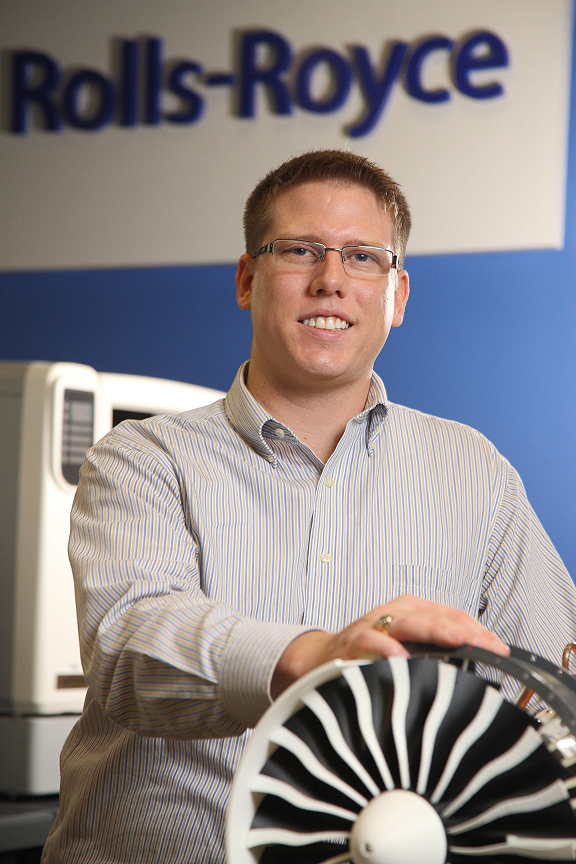Most college graduates are lucky to be able to include six months of internships, cobbled together over several summers, on their resumes. Not Aaron Holowaychuk.
Holowaychuk is a student in Engineers PRODUCED in Virginia, the online bachelor’s degree program in engineering science offered by the University of Virginia’s School of Engineering and Applied Science for graduates of the Virginia Community College System. Because of the program’s flexibility, Holowaychuk was able to spend more than 18 consecutive months interning at the Commonwealth Center for Advanced Manufacturing. After graduation, he will spend another three months at Rolls-Royce, one of the center’s founding partners.
“As a PRODUCED student, you have the opportunity while you’re going to school to accumulate extensive real-world experience,” he said. “It’s one of the advantages of the program.”
Holowaychuk’s internship at the Commonwealth Center for Advanced Manufacturing’s 60,000-square-foot, state-of-the-art research facility in Prince George County provided him with a particularly rich set of experiences. The center is a research-based collaboration between the University of Virginia, Virginia Tech and Virginia State University, and manufacturing companies worldwide. Its focus is surface engineering and manufacturing systems.
“At CCAM, I created [computer-aided design] drawings and conducted microscopic evaluations of thermal barrier coatings,” Holowaychuk said. He also became the center’s resident authority on Microsoft SharePoint, a program that enables organizations to store, share and collaborate on files. Equally important, he built a network of contacts with engineers at the center and its member companies.
“From an educational point of view, Aaron’s ability to immediately apply concepts he learned in class is very powerful,” said James Groves, associate dean for online innovation and director of the PRODUCED program. “It solidifies knowledge in ways that would be difficult to duplicate otherwise.”
Engineers PRODUCED in Virginia fit Holowaychuk’s needs in other ways as well. He was living in the Richmond area, close to his family and girlfriend (soon to become his wife). While completing an associate’s degree at J. Sergeant Reynolds Community College he set his sights on completing an engineering degree without leaving home. Engineers PRODUCED in Virginia – expressly designed to enable nontraditional students to complete a bachelor’s degree in their home communities – was the answer.
“I wasn’t looking for a college experience,” Holowaychuk said. “I was looking for a quality education.”
Although initially hesitant about taking a degree online, Holowaychuk was swayed by the reputation of U.Va.’s engineering program. As it turned out, he needn’t have worried. He took regular U.Va. classes broadcast in real time from specially equipped classrooms. Holowaychuk and his fellow PRODUCED classmates could digitally raise their hands, ask questions and participate in discussion.
“U.Va. faculty did a great job merging off-Grounds and on-Grounds students,” he said. “It was as if they were teaching two classes simultaneously.”
Holowaychuk was particularly impressed by the efforts that assistant professor Gavin Garner made in adapting “Mechatronics,” a laboratory course that combines computer science with electrical and mechanical engineering. Garner sent each off-Grounds student a lab kit with everything they needed to complete the assignments. “There was just a single time I had to come to Charlottesville to work with a large component,” Holowaychuk said.
Otherwise, Holowaychuk used Skype or Microsoft Lync to work on projects with mixed groups of on- and off-Grounds students. “From a professional point of view, the experience of collaborating with people at different locations is invaluable,” he said. “I know from my work with CCAM that this is how global engineering is conducted.”
U.Va.’s success in delivering courses to students off-Grounds has led Holowaychuk to propose that the program be adapted for on-Grounds students. “The technology is in place,” he said. “Instead of having just a summer internship, on-Grounds students could extend that internship into fall and take classes, as I did, at a distance. It would add a whole new dimension to their education.”
-- Charlie Feigenoff
Media Contact
Article Information
May 14, 2014
/content/learning-while-doing-engineering-grad-interns-while-earning-degree

